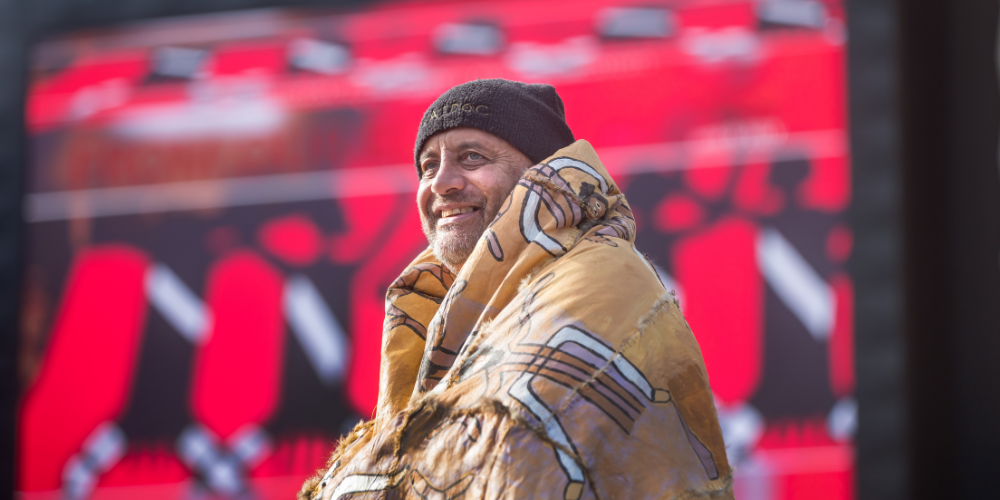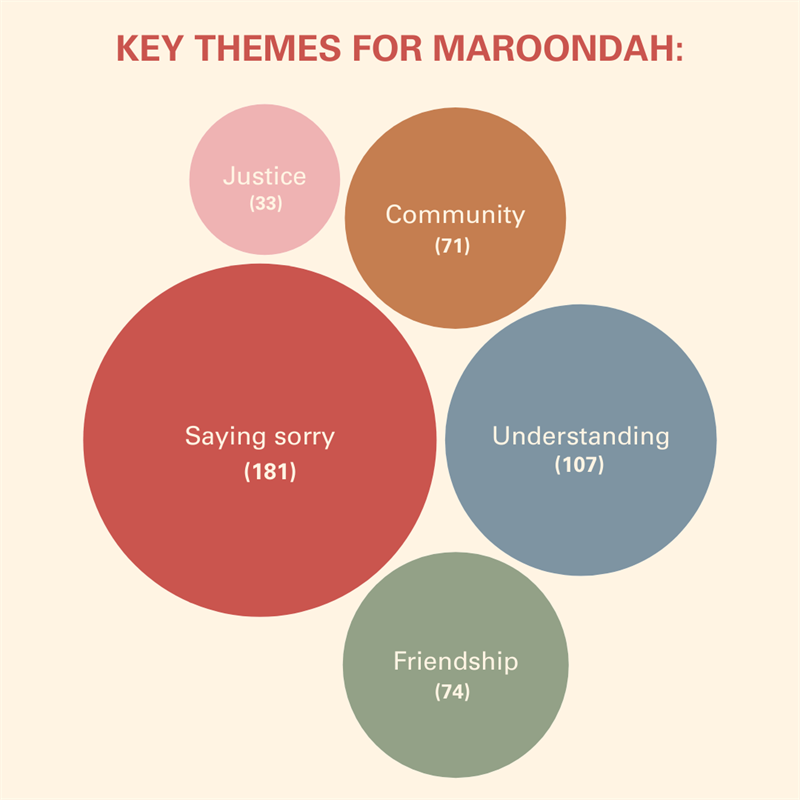Reconciliation

Uncle Bill Nicholson Maroondah Celebrates Reconciliation event in Ringwood Town Square
Reconciliation is about improving relations between the First Peoples community and non-Indigenous peoples in Australia.
“A reconciled Australia is one where our rights as First Australians are not just respected but championed in all the places that matter”
- Reconciliation Australia
Reconciliation Australia’s vision of reconciliation is an ongoing journey based and measured on five inter-related dimensions:
- historical acceptance
- race relations
- equality and equity
- institutional integrity
- unity.
For more information about the five dimensions of reconciliation, visit Reconciliation Australia.
Maroondah and Reconciliation
Maroondah City Council has been working towards reconciliation with our First Peoples community since 2000.

Reconciliation Policy Statement
In 2008, a Reconciliation Policy Statement was adopted by Council. The Policy included four statements:
Cultural Heritage and Community Education - Council will work in partnership to provide a greater knowledge and appreciation of Aboriginal and Torres Strait Islander peoples, culture, traditions and history.
Economic Development and Employment - Council will consult with the Aboriginal and Torres Strait Islander community to develop socially responsible practices that facilitate the development of education, employment and business opportunities for Aboriginal and Torres Strait Islander people within the wider and business communities.
Health and Wellbeing - Council acknowledges that health and wellbeing in the Aboriginal and Torres Strait Islander community is a holistic concept and, as such, incorporates respect for culture, land, spirit and identity as well as access to appropriate mainstream services. Council is committed to collaboratively working with Aboriginal and Torres Strait Islander residents to ensure an optimal state of health, safety and wellbeing.
Governance - Council will underpin its services to the community with the principles and practices of good governance including participative decision-making processes and culturally sensitive staff.
Outcomes:
- Protocols were developed for the Acknowledgement of Traditional Landowners and Welcome to Country.
- Aboriginal flag displayed permanently at the Ringwood and Croydon Civic Centres and EV’s Youth Centre.
- Educational based activities in schools using Aboriginal and Torres Strait Islander artists/educators.
- Wurundjeri Cultural Education Sessions about Wurundjeri culture, sustainability, history and current issues for Council staff.
- Aboriginal and Torres Strait Islander artworks were purchased for the Maroondah Art Collection.
- Cultural Heritage Review of the Dandenong Creek Shared Pathway Project.
- Employment programs and traineeships were explored with Aboriginal and Torres Strait Islander Elders.
- Cross-cultural training became a core training item for all new Youth Services staff.
- Strong relationships were formed between Maternal and Child Health and Mullum Mullum Indigenous Gathering Place’s playgroups, and culturally sensitive toys, posters, and education materials were provided at MCH appointments and Immunisation sessions.
- An Aboriginal and Torres Strait Islander Cultural Awareness training session for Councillors and senior management across the Eastern Metropolitan Region (EMR) was hosted at Maroondah Federation Estate.
Reconciliation Action Plan (RAP)
In 2019, Council adopted its first Reconciliation Action Plan.
The RAP focuses on strategies such as:
- consultation with Elders, Traditional Owners groups, and First Peoples organisations to discuss how to best support Indigenous communities
- Occasional care initiatives aimed at connecting First Peoples to their culture
- restoring and caring for local park life, with a focus on increasing biodiversity
- and providing employment opportunities for First Peoples living in the Maroondah City Council area.
In March 2023, Council commenced a process to develop the next Reconciliation Plan for Maroondah.
Maroondah Occasional Care
Maroondah Occasional Care developed a Reconciliation Action Plan specific to its centre through Narragunnawali. The implementation of this action plan will embed First Peoples culture into their programs. with actions such as purchasing authentic resources to educate children and families, connecting to Country through art and craft experiences, and creating connections with local branches of several First Peoples services.
What does reconciliation mean to you?

To celebrate Reconciliation Week in 2023, Maroondah City Council sent a request out to schools and early childhood centres to complete an art activity with their children and students.
Each child was given a paper outline of a manna gum leaf and encouraged to think about and answer the question on their leaf “What does Reconciliation mean to me?” .
The gum leaves were pinned to a painted tree on canvas (completed by the MMIGP Youth Group) that was hung on the outside wall of ArtSpace, Realm.
What our community said:

- Not pretending that colonisation was a relic from a darker time, and being honest about our past as a nation.
- To take a moment to think of the impact that the European settlement had on First Nations people.
- Sorry to the Stolen Generation.
- Acknowledging and actively taking measures to assist Aboriginal communities and project their voices.
- Reconciliation means saying sorry for past actions and acknowledging different cultures.
- Valuing others and their opinions and beliefs. Finding a balance between people of varying cultures.
- Include their traditions into our educational learning.
- Listening to the voices of Aboriginal people.
- We cherish the land we hold in our hands and come together to commemorate and say sorry.
- Coming together to appreciate our differences and share our stories.
- To reconciliate means to come together.
- Never ending respect.
- Michael Long played a significant role in raising awareness and promoting reconciliation between indigenous and non-Indigenous Australians.
- Recognising what the Europeans did to the First Nations people and saying sorry.
- To respect the elders past, present and emerging.
- Sorry for taking your country.
- Restoring justice.
- Say 'NO' to racism!
- Strengthening our relations with First Nations people and apologise for previous wrongdoings.
- Reconciliation means to me: uniting, making friends, caring for our land and having hope.
- Becoming friends.
- Australia past/present/future.
- Give the land back.
- Respect their rules, play their sport.
- Creating a better future. I think reconciliation means to reconnect.
- Reconciliation means that we are saying sorry to all of the stolen generations.
- I am listening.
- Everyone has a voice, let's use that voice to speak up.
- Telling the truth about our history.
- I love indigenous culture.
Key themes for Maroondah:

The key themes for Maroondah were:
- saying sorry
- understanding
- friendship
- community
- and justice.